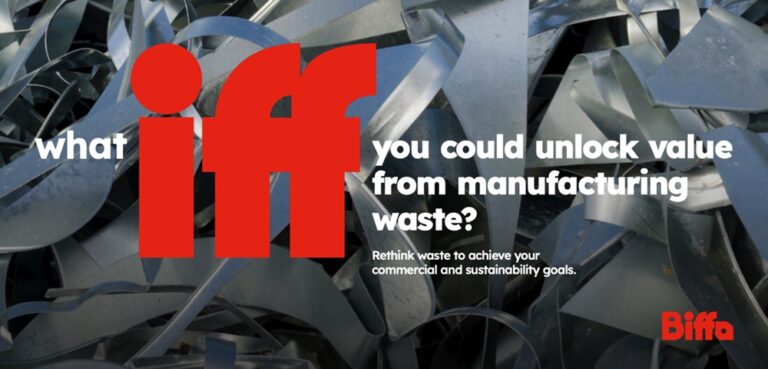Sustainable waste management company Biffa has today released a guide advising manufacturers on how to unlock value from waste to achieve their sustainability and commercial goals amid pressures like rising costs and legislation such as EPR.
In its commitment to helping the sector reduce its carbon footprint, Biffa’s guide – ‘What ‘iff’ you could unlock value from manufacturing waste?’ – examines the lifecycle of manufacturing waste, from design to disposal.
It identifies opportunities to keep the vast range of waste materials generated by a complex production process in the circular economy as far as possible (via recycling, reuse or resale). Biffa’s experts have extensive experience optimising processes for major food, industrial and chemical manufacturers to help them be more sustainable. They have developed this guide to highlight areas worth another look.
The guide also examines barriers (from packaging decisions to contamination) and their workarounds to ensure manufacturers aren’t missing opportunities to save and earn money from waste.
Backdropping this practical advice from business waste experts are emerging sector trends and relevant legislation. For example, EPR means that manufacturers are now financially responsible for packaging disposal and must submit comprehensive reporting, impacting both the bottom line and operational efficiency.
Stringent regulation, rising costs, a tumultuous period of supply chain disruption and skill shortages exacerbate the complexity of the production process and the associated waste it creates in a fast-paced environment (particularly where hazardous and hard-to-recycle materials are concerned).
Given the turbulence, it’s no surprise that manufacturers are prioritising generating higher revenue (67%) and achieving cost-efficiencies (65%) over sustainability, according to a Biffa survey conducted by the YouGov analysis institute*.
To help businesses be more sustainable while achieving efficiencies and protecting the bottom line, Biffa has launched Manufacturing Waste Solutions.
Its sector experts integrate into an organisation to understand manufacturing processes along with the inputs, outputs and engrained culture. They identify waste hotspots and the operational inefficiencies causing them while also analysing broader processes.
Before any contracts are signed, Biffa will craft a data-driven customer improvement plan based on a detailed manufacturing audit, promising to deliver savings and added value over the first two years – giving manufacturers certainty before committing.

Gavin Williams, Managing Director of Specialist Services, Biffa, commented:
“Manufacturers play a vital role in the UK supply chain and economy at large but, as our studies show, they’re caught in a bind protecting the bottom line over sustainability even though the two aren’t mutually exclusive. For example, businesses can earn rebates from recyclables while lowering the volume of general waste by segregation – and therefore the number of collections – reducing transport spend. The innovation to unlock change ranges in complexity, and our embedded experts are key to finding the solution.
“Manufacturers can rely on our data and specialist expertise, scale, and facilities to simplify not just the end-to-end waste management process but also unlock value. We’re dedicated to supporting the sector’s continuous improvement and long-term success.”
If you’d like to book an audit or learn more about how Biffa’s Manufacturing Waste Solutions can help you, please email manufacturingwastesolutions@biffa.co.uk with ‘MWS audit request’ as the subject line or populate this entry form.

